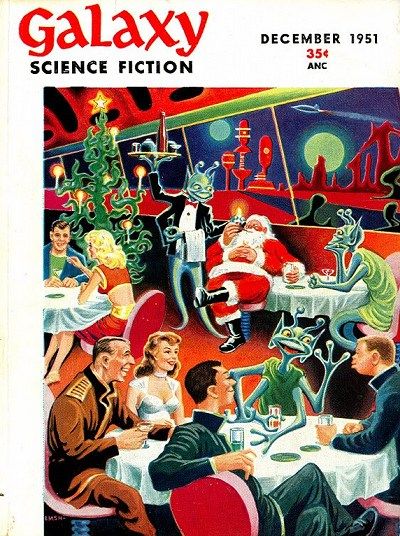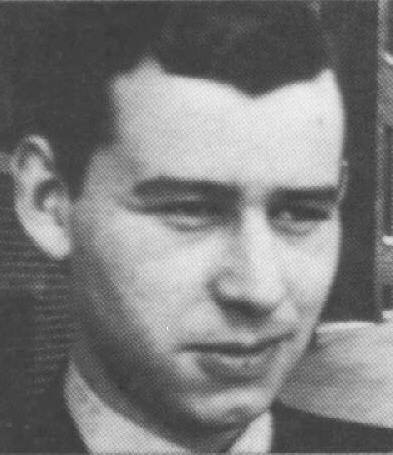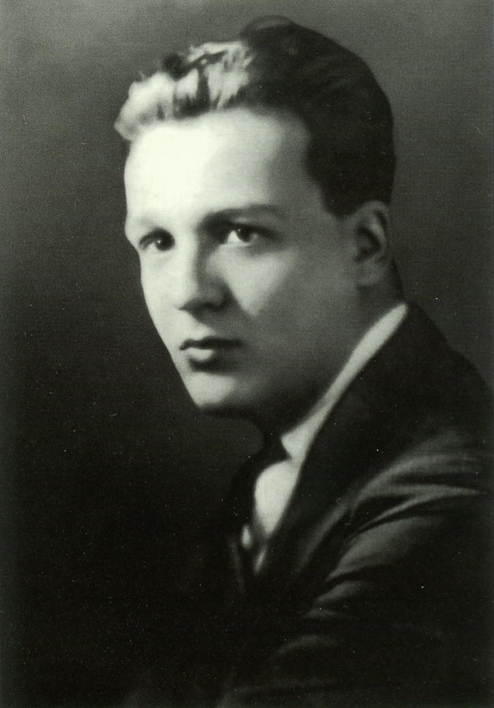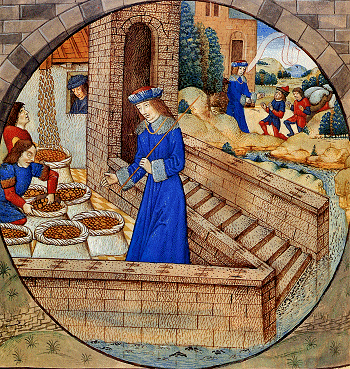This short story of a mere incredible 15 pages first appeared in the December 1951 issue of Galaxy Science Fiction. Folks, this is what speculative fiction is all about. It fits to the highest degree I have yet encountered where imaginative scientific speculation balances with real human interest, where fictional skills give a plausible and fascinating account of how the dramatic interaction of certain physical laws of the universe can directly affect the nuclear family, our most essential social and psychological unit. What if a black dwarf star, its own system of planets long since obliterated when it swallowed them up in an earlier red giant phase, were to pass in its orbit about the galactic center through our solar system, most specifically among our inner planets? What if its massively condensed gravitational force tore us free of the Sun's primordial hold upon us and drew us out into the depths of coldest empty space, the Earth now a slave to a dead but tenacious bone of a star whose only indication to the human senses is its circular blotting out of the stars as we face it on what amounts to a nocturnal "day". Would anything survive such a catastrophe?
Leiber keeps our focus on a single family, from the point of view of the brother/son, which otherwise consists of a mother, father, and sister. We understand this world through the boy, what he experiences, what he has learned from his parents, and how he interacts with his family members. For all them, they are all they know that remains of life. The world has passed through massive earthquakes as it experienced the violent gravitational shift from one orbital orientation to another. It has lost its atmosphere in this process. It's atmospheric gasses have fallen to the surface as snow in ordered sediments according to their susceptibility to solidification amidst steadily falling temperatures, as the black dwarf star has drawn the Earth farther and farther away from its former reliable source of warmth: the Sun -- which is now a star unremarkable from any other in the night sky. The family survives on huge stockpiles of non-perishable food left unconsumed by the massive die-off of humanity during the crisis of tug of war between our living star and the dead invading star, and the ensuing planet-wide ice-age. They also live on blue-white oxygen in the form of a distinct layer of snow, which the boy is now old enough to fetch on his own with a metal pail.
The boy's family lives in a quake-damaged apartment building where his father, a former scientist, has created a room protected by suspended layers of cloth and mattress barriers to slow the escape of oxygen. The structural deviations in the building from the period of rampant earthquakes makes hermetic sealing impossible. The oxygen is released into breathable gaseous form by melting it on the fire, whose fuel source is lumps of coal (ready supplies of which could have been gathered from innumerable basements back in the early '50s when this story was written because home and apartment building furnaces were directly powered by coal rather than indirectly, as many are now). Outside the family's "cooked" atmosphere, there is not much in the way of sound, especially when one leaves the building and enters the outside, where there is no free air to carry sound, no wind or breeze. The father has constructed helmeted suits for their brief and necessary ventures outside their lonely little refuge. Our first-person-point-of-view character visually understands the world known to we readers only in terms of the illustrations in encyclopedias their parents gathered for the education of their children, for both he and his sister were conceived and born after the catastrophe.
Their parents sought to affirm their survival and their commitment to the continuation of the human species by having offspring of their own once they figured out a way to survive in the long term, hoping that one day they might discover others who might have seized upon similar ways to sustain existence. But the mother has abandoned this dream years ago, and where once she was the strong one who had helped keep the family alive when their father was laid up with an injury, now she has become a neurotically fragile being whom the whole family endeavors to comfort. The boy knows by first hand evidence that there were once others, because in their quests for supplies, they sometimes pass by other rooms in the apartment complex where human beings remain perfectly preserved in their moment of death, many in circumstances indicative that they had surrendered to the dire consequences into which the whole world had been suddenly plunged. The father is the chief storyteller, continually shaping and refining the legend of the world before and the world now as their children grow in maturity and understanding, and these stories are their chief form of entertainment.
This story, however, begins, when the boy on his daily chore to acquire another pailful of air catches a hint of light and a moving figure. The immediate reaction is not that of hope or rejoicing, but caution, guardedness, the controlled fear and carefulness of proven survivors. The boy retreats to tell his family, and the mother becomes so agitated, that the father brushes it off as likely an illusion created by the effect of the boy's flashlight and the oozing nature of viscous helium, which is present here and there in the extreme cold, taking on furtive, beguiling forms to the sensory-fractured perceptions of the human cognitive imagination in such a literally benighted world. The father, however, after interviewing him more closely, confides to his son that he may have indeed seen something "real". They go out to explore, which gives Leiber another opportunity to paint a fascinating and ghastly picture of their broader world. They find nothing more to substantiate the boy's report, but on their return, it inspires the father to give a more passionate telling of how everything came to be. The family is brought back to relative calm, the sister physically soothing their mother the while, who had grown afraid again when the father and son had gone out to investigate, despite her husband's bland assurances.
And then the calm is disturbed. At first by faint resonances, then indirect flickers of light of alien origin. The family unit goes on its guard, even though they have never known another animate being in all the years they have been together. The ending I will not spoil, but it is transformative. Even without revealing the ending, whose outcome could easily have been other than what the author has chosen given the circumstances already described, the reader is still left to ask: does it make sense to keep trying, even when all available evidence of hope is not at hand? In a world of ultimate uncertainty, does it make sense to gamble and have children, consigning them to a most uncertain destiny? Is creating and nurturing a family the most essentially beautiful thing to do in the face of an uncompromisingly ruthless universe, even after it has literally removed its sunny mask to reveal its awesomely dark nothingness? How long can the human psyche, whether it be that of an adult, a child, a male or female, endure social isolation and sustain its sanity, even in the benignly integrated relationships of tightly-knit disciplined, responsible interdependence?
Mr. Leiber, you have created here a beautiful interweaving of scientific cosmological profundity and the humble centrality of our shared humanity as the sentient witness to it all. Here you combine palpable detail with astrophysical laws as understood through the filter of a bright child too young to grasp the technical language of science or its complete implications for reality itself. You, Mr. Leiber, are indeed a writer of subtlety and depth, and though you have been gone from this world for many years now, your special mind and soul live on through its literary impact upon we, your fortunate readers! This story can most easily be acquired in this latest collection: Selected Stories by Fritz Leiber; Published by Night Shade Books; Copyright 2011.
Sunday, April 8, 2012
Subscribe to:
Comments (Atom)


























